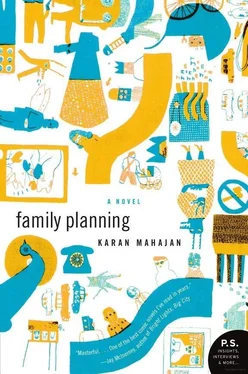Yes. That was the problem. With Sangita, you couldn’t get past the details.
Worse, Mr. Ahuja had never really tried. But thinking of Sangita had turned him on, and in a sudden rejuvenation of passion, he exited the study, walked to the nursery, knocked on the door, and entered.
The nursery was a large whitewashed room with ten cots — three of which were full at present (Vikram: two months, Gita and Sonali: eleven months) — and the permanent fixture of Mrs. Ahuja sitting in the center on a stool, knitting. She was forty years old — the type of forty that led people to comment “You look too young to be sixty.” Her head was covered with a dupatta and she looked up for a brief instant. She was tall and had an imposing bun of black hair. She always wore gray saris during the day. The matronly cloth revealed a sideways curve of stomach cleavage. Streaks of silver hair fell across her face; her mouth was tightened into a hyphen in the manner of a woman who is terrified of her own luscious lips (only she had tiny, thin lips). A fan creaked overhead; the actor Amitabh Bachan muttered imprecations from the TV.
The TV was placed in front of the window, an alternative natural light. Mrs. Ahuja hated natural light. The room smelled of saliva and Johnson & Johnson baby powder.
Immediately Mr. Ahuja started bellowing. “What was Arjun doing here last night? Why was he coming here, tell me? I thought I told you he doesn’t need to look after the babies. He’s a grown man now — he shouldn’t be jumping from his bed the minute a baby makes a noise, correct? Are you listening?”
He hadn’t initially intended to bellow. He’d meant to get on his knees before her and whisper inanities into the smooth rotunda of her stomach. But being back in the nursery, he’d been struck afresh by how perfectly horrible it must have been for his son to stumble upon his parents sprawled out on the floor, and his thoughts sputtered into puffs of irritation. He was his dark, bitter self again. He saw the reality of the situation in the form of a newspaper headline: MINISTER AHUJA PRO-POSES NEW BILL FOR SEX EDUCATION ON THE FLOOR OF THE HOUSE ; BABIES TO BE EXPOSED AT YOUNGEST AGE POSSIBLE.
“I am listening, ji,” said Mrs. Ahuja.
Mrs. Ahuja did not raise her voice, partly out of habit, partly out of resignation, mostly on purpose.
Mr. Ahuja, not hearing, continued. “Accha. Also, tell Shanti I want her to make me khichdi to take to office. I need to eat light food for lunch. Everyday these buggers at functions make me eat bloody heavy Kashmiri-type food.”
“Ji, Shanti has left.”
“Where has she gone?” Mr. Ahuja scowled. Then, in a graceful arc from irritation to affection, he lifted up baby Vikram and started cooing.
“Home, where else?” said Mrs. Ahuja, casting off a stitch from her needles.
“Why did she leave so suddenly?”
Mrs. Ahuja mumbled, “She threw away the towels.”
“So she was fired ?”
“Yes, ji.”
Mr. Ahuja sighed. He put Vikram back in his crib and tickled his stomach. Then he turned to Mrs. Ahuja. “Darling, what is this you’ve done? Please explain this to me. What crime has she committed against you? Sangita, it is because of women like you that the servant-types will one day have a union. Whenever you feel like you fire them. Then you make my son do the work instead. You’ve made Arjun into a maid.”
“The maid is not listening,” Mrs. Ahuja offered. “Today she tried to throw the towels I keep in the almirah.”
“Arjun did this?”
“She, ji.”
“She who?” Mr. Ahuja threw up both hands.
“The maid.”
“You and your pronouns. Which one is this now?”
“Shanti.”
“I thought she was fired.”
“She is,” said Mrs. Ahuja. “Because of towels—”
“Hai Ram, Sangita. I’ve seen those towels. They’re completely ruined. They’re moth-eaten. They’re rough. They should be thrown away.”
“Okay, ji,” said Mrs. Ahuja, rocking a little on her bamboo stool. “I was only trying to maintain the hygiene. You only said we needed the hygiene.”
“HYGIENE?” coughed Mr. Ahuja.
“Ji, when I am going to do toilet, after I have used mug sometimes there is still some cleaning required on buttocks. For that I am using towels. Hygienic it is—”
“How many times have I told you: you don’t DO THE TOILET? You GO TO THE BATHROOM!”
“Sorry—”
“What sorry, Sangita?” said Mr. Ahuja. “My children are all speaking like you now. Please. Firstly, either speak Hindi or speak English. This in-between thing is stupid. None of this nonsense. Get rid of the towels. Bring the maid back. I don’t have time for this. And I thought I told you to throw these away,” he said, pointing to the oranges that sat on the windowsill. “These oranges — look at them, Sangita — they are all green. That is mold. That is bad for these babies breathing. Do you know that? Already all of them have asthma? Please, no more trying to save on these things.”
“Okay, ji,” she said. She wiped her hands on a napkin. A pyramid of scrunched napkins lay on the plate behind her. “I’ll give them to Shankar’s family.”
Shankar was their servant. Miraculously, he’d been their servant for a decade. All the other servants — and as a minister, Mr. Ahuja could have had an entourage of domestics — were dismissed within days of their hiring.
Mr. Ahuja intervened. “Do no such thing. And please — I don’t want Arjun to do anything today. No diaper changing, no massage, no baby exercises. I need to talk to him today.”
“Okay, ji,” she said.
Then, hesitating, she gestured toward the household deity — the TV — and said, “He died.”
“ENH?”
“He died,” she said in Hindi. “Wo mar gaya.”
“ Tomorrow, kya? Eh?” he said. “Sangita, why would I say tomorrow when I am saying today ? I want to talk to him today!”
Mrs. Ahuja gave up.
CHAPTER 3. THE SUDDEN BRIDE
WHAT COULD HE TELL HIS SON? Mr. Rakesh Ahuja wondered.
Son, these things are normal in a family? Your mother loves babies and wants more and more? People have sex in this manner all the time — how else is it done in villages? Ahem, what exactly is a condom?
He reclined in the back seat of his official Ambassador car, hypnotized by the driver’s constant and incoherent grumblings about a recent cricket match. He was on his way to work. His sense of sudden well-being was reinforced, no doubt, by the serenity of Delhi at 7:50 A.M. before 10 million people woke up, had their morning tea, and decided, in a mind-boggling coincidence, that today they would put their all into bringing the city within inches of utter ruin. The city’s roads at this hour — actually about the same temperature as just-burnt toast — looked cool and shady through the tinted glass. On the central island on the main road was an array of red pots with saplings that he hoped would bloom the year Rita — his second favorite after Arjun — turned seventeen, and he followed the island with his eyes till it disappeared under the largest permanent shadow in Delhi, the underside of the Secretariat Flyover, the most beautiful, complex sandstone monument this side of Rashtrapati Bhavan — its four arms and blossoming ventricles of greenery and the general curvature of the roads designed to look like a giant lotus from the air, so that when Mr. Ahuja rolled down the window he could feel in his dry throat the concentration and densification of life that the flyover would bring to the area when it opened three months from now.
He secretly relished the fact that the space under flyovers provided housing for shanties and beggars and runaway children and the homeless; he liked that you could grab the yellow railing and walk alongside the traffic, a thing unheard of in India; he saw the bowed columns and arches that held the entire structure aloft and was conscious of having recolonized the city.
Читать дальше












